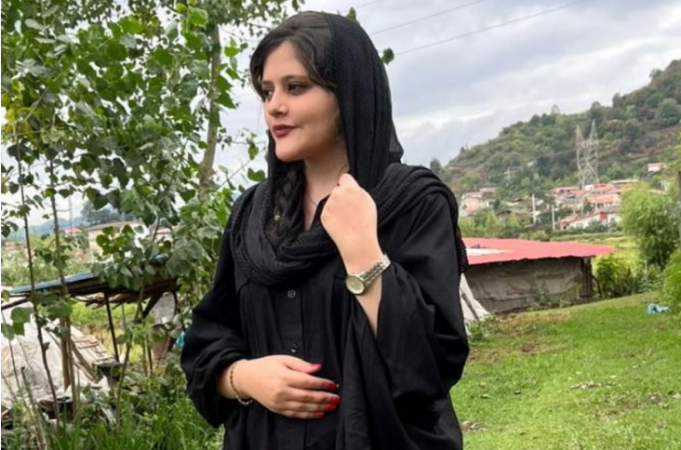
Iran: A deadly crackdown in Iran has raised global alarm over protests erupted in response to the death of young Iranian woman Mahsa Amini following the arrest by Tehran's notorious morality police.
Amini, 22, died on Friday after being taken to a hospital, three days after being detained by police for enforcing Iran's strict dress code for women.
Activists claimed he was hit in the head while in custody, but Iranian officials, who have launched an investigation, have not confirmed this.
According to state media on Wednesday, protests in Iran spread to 15 cities overnight.
According to the official IRNA news agency, during the fifth night of street protests, police used tear gas and arrested a crowd of 1,000 people to disperse.
Protesters blocked roads, attacked security personnel with stones, set police cars and dustbins on fire and raised anti-government slogans, this process continued.
Since the unrest over the fuel price hike in November 2019, Iran has experienced some of its most serious protests, this time distinguished by the participation of a large female population.
In defiance of the strict laws of the Islamic Republic, they sometimes took off their headscarves, and sometimes even set them on fire or symbolically cut their hair.
According to IRNA, the rallies took place overnight in the country's capital Tehran as well as other important cities such as Mashhad in the northeast, Tabriz in the northwest, Rasht in the north, Isfahan in the center and Shiraz in the south.
According to the Fars news agency, the governor of Kurdistan province Ismail Zarei Kusha confirmed the deaths of three people and insisted that they were "suspectedly killed" as part of "a conspiracy by the enemy".
However, activists claim that several people have also been injured and allege that the use of live fire by security forces is responsible for the casualties.
Witness accounts and videos that went viral on social media, according to Human Rights Watch in New York, "indicate that officers are using tear gas to disperse protesters and apparently lethal force in the province of Kurdistan." it used."
According to the United Nations, Amini's death and the "violent response by security forces to the ensuing protests" alarmed Geneva's acting High Commissioner for Human Rights.
It argued that "the tragic death of Mahsa Amini and the allegations of torture and abuse" needed an impartial investigation.
According to Hangau, a Kurdish human rights organization based in Norway, a total of three deaths, one each in the city of Divandareh, Sakkej and Dehgolan.
In Kurdistan, where a general strike also took place on Monday, it was also said that 221 people were injured and 250 others were detained.
According to Hango, a 10-year-old girl was injured in the city of Buchan, but she was still alive, and pictures of her blood-soaked body have gone viral on social media.
Protesters were heard shouting "death to the dictator" and "women, life, liberty" as they attempted to overturn and set fire to police cars in several cities.
According to US National Security Adviser Jake Sullivan, "It is not surprising to us that we are seeing people of all backgrounds in Iran strongly object to this and say that it is not the kind of society in which they want to stay
Mahmoud Amiri-Moghaddam, director of the Norway-based Iran Human Rights (IHR) NGO, said that nations having diplomatic relations with Iran "must prevent further state killings by supporting the demands of the people to realize their basic rights". for" action should be taken.
According to the IHR, security forces "crushed the protests" in some areas using sticks, tear gas, water cannons, rubber bullets and ammunition.
The semi-official ISNA news agency quoted the communications minister as saying on Wednesday that Internet access in Iran could be disrupted "for security reasons".
The security system may decide to impose internet restrictions due to security concerns and the current political debate in the country, but overall there has been no reduction in bandwidth, according to Issa Zarepor.
Iran's ultra-conservative President Ibrahim Raisi will be under even more pressure as a result of the situation. Raisi is in New York this week for the UN General Assembly, where he will already be under close scrutiny for his country's record on human rights.
A civil trial against Raisi for his role as a judge in the 1980s, when the nation killed thousands, was announced Tuesday by dissidents and former prisoners in New York.
According to Cameron Khansariniya, political director of the Advocacy Group of the National Union for Democracy in Iran, the complainants are "echoing the cries we hear on the streets of Iran today".
US and Iran to speak at UN; Zelensky to appear from Ukraine
lawsuit against Raisi is filed by Iranian dissidents and former regime captives